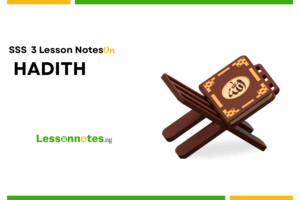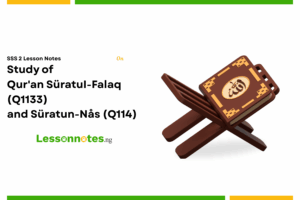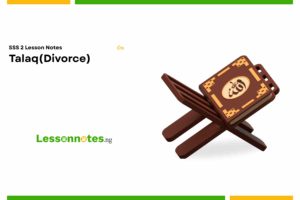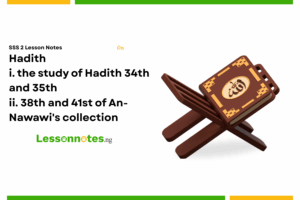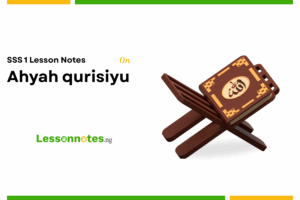Moral Lessons from Qur’an and Hadith SS2 Islamic Studies Lesson Note
Download Lesson NoteTopic: Moral Lessons from Qur’an and Hadith
The Qur’an and Hadith are the two main sources of guidance in Islam. The Qur’an contains the words of Allah revealed to Prophet Muhammad (peace be upon him). Hadith are the sayings and actions of Prophet Muhammad that were remembered and written down by his companions. Together, they teach Muslims how to live a good life with strong moral values.
Importance of Moral Values in Islam
Islam places great importance on having good character and moral values. Prophet Muhammad (peace be upon him) said: “I have been sent to perfect good moral character.” This shows that one of the main purposes of Islam is to teach people how to be good and kind.
The Qur’an says: “Indeed, Allah orders justice and good conduct” (16:90). This verse tells Muslims that Allah wants them to be fair and do good deeds. Following moral teachings helps Muslims become better people and build a peaceful society.
Key Moral Lessons from the Qur’an
- Honesty and Truthfulness
The Qur’an teaches Muslims to always tell the truth. Allah says: “O you who believe! Fear Allah and be with those who are truthful” (9:119). This verse reminds Muslims that being honest is a sign of faith.
Being honest means:
– Speaking the truth even when it is difficult
– Not hiding facts or telling lies
– Being honest in business dealings
– Keeping promises
- Kindness to Parents
The Qur’an places special importance on being kind to parents. Allah says: “Your Lord has decreed that you worship none but Him, and that you be kind to parents” (17:23). This verse shows that being good to parents is one of the most important duties after worshiping Allah.
Ways to show kindness to parents include:
– Speaking to them with respect
– Obeying them in good matters
– Taking care of them when they grow old
– Praying for them
- Helping the Poor and Needy
The Qur’an repeatedly encourages Muslims to help those who are less fortunate. Allah says: “And they give food, in spite of their love for it, to the poor, the orphan, and the captive” (76:8).
Ways to help the poor include:
– Giving charity (Zakat and Sadaqah)
– Sharing food and clothes
– Visiting sick people
– Supporting orphans
- Patience in Difficult Times
The Qur’an teaches Muslims to be patient when facing hardships. Allah says: “O you who believe, seek help through patience and prayer. Indeed, Allah is with the patient” (2:153).
Patience means:
– Staying calm during problems
– Not complaining too much
– Continuing to have faith in Allah’s plan
– Working hard without giving up
- Forgiveness
The Qur’an encourages Muslims to forgive others who have done wrong. Allah says: “Let them forgive and overlook. Do you not wish that Allah should forgive you?” (24:22).
Forgiveness helps people:
– Heal broken relationships
– Feel peace in their hearts
– Build stronger communities
– Receive Allah’s mercy
Key Moral Lessons from Hadith
- Kindness to All Creation
Prophet Muhammad (peace be upon him) taught Muslims to be kind to all living things. He said: “The merciful are shown mercy by the Most Merciful. Be merciful to those on earth, and the One in heaven will be merciful to you.”
This includes:
– Being kind to animals
– Protecting the environment
– Helping people regardless of their religion
– Speaking with gentle words
- Good Manners in Daily Life
The Prophet emphasized having good manners in everyday situations. He said: “Nothing is heavier on the scales (of good deeds) than good manners.”
Good manners include:
– Greeting people with “Assalamu alaikum” (Peace be upon you)
– Saying “please” and “thank you”
– Not speaking badly about others
– Respecting elders and being gentle with children
- Controlling Anger
Prophet Muhammad taught Muslims to control their anger. He said: “The strong person is not the one who can wrestle others down. The strong person is the one who can control himself when angry.”
Ways to control anger:
– Taking deep breaths
– Saying “I seek refuge with Allah from Satan”
– Changing position (if standing, sit down)
– Performing wudu (ritual washing)
- The Importance of Learning
The Prophet encouraged Muslims to seek knowledge. He said: “Seeking knowledge is a duty upon every Muslim.”
This teaches Muslims to:
– Value education
– Learn throughout their lives
– Share knowledge with others
– Make decisions based on correct information
- Being Good to Neighbors
Prophet Muhammad placed great importance on treating neighbors well. He said: “Gabriel kept recommending that I treat neighbors well until I thought he would make them my heirs.”
Being good to neighbors means:
– Helping them when they need assistance
– Not disturbing them with noise
– Sharing food with them
– Checking on them when they are sick
How to Apply These Moral Lessons in Daily Life
- At Home
– Speak respectfully to family members
– Help with household chores
– Be patient with siblings
– Share with family members
- At School
Be honest in exams and assignments
– Respect teachers and classmates
– Help friends who struggle with lessons
– Be patient when learning difficult subjects
- In the Community
– Participate in community service
– Help neighbors in need
– Be truthful in all dealings
– Control anger when facing problems
- On Social Media
– Share truthful information
– Speak kindly in comments
– Respect others’ privacy
– Use time wisely
Benefits of Following Moral Teachings
Following the moral teachings from the Qur’an and Hadith brings many benefits:
- It helps build a peaceful society where people trust each other.
- It leads to inner peace and happiness.
- It strengthens family and community bonds.
- It helps Muslims earn Allah’s pleasure and rewards in the hereafter.
The Prophet Muhammad (peace be upon him) said: “The best among you are those who have the best character.” This shows that being a good Muslim is not just about performing rituals but also about having excellent moral character in all situations.
By learning and applying these moral lessons from the Qur’an and Hadith, we can improve ourselves and please Allah through our good actions and kind treatment of all His creations.







